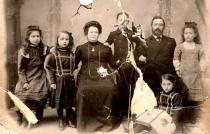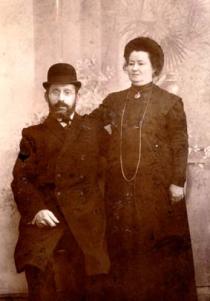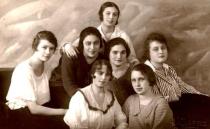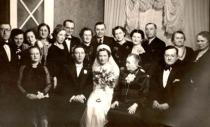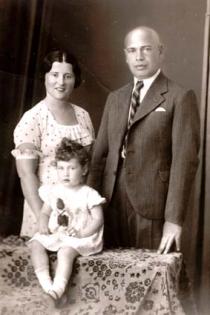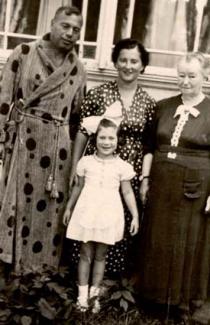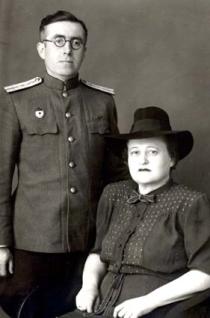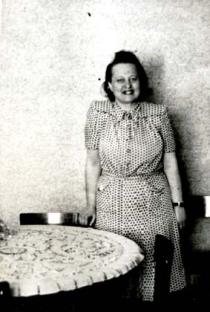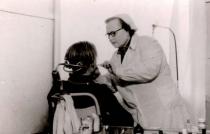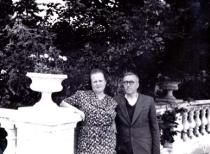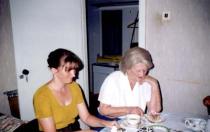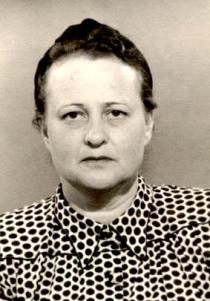
Maria Sorkina
Tallinn
Estonia
Interviewer: Ella Levitskaya
Date of interview: June 2005
When the Estonian community suggested that I interview Maria Sorkina and mentioned that she was 104 years old, my first response was to refuse. I just couldn’t believe that a person of this age could speak logically. Even on my way to her house I was still thinking that this whole thing was a bad idea. However, when I saw Maria, I was surprised. The only sign of her age is that Maria has a problem walking. She has to move around in a wheel-chair. Maria is a short and slender lady. Her hair is nicely done, and she puts on lipstick. She wore a black skirt and a snow white blouse with lace and an ancient brooch on the collar. Maria lives alone. A visiting nurse attends to her in the morning and evening, the rest of the time Maria does things about the house. She told me that even in her childhood she tried to be independent. It’s amazing how she can manage alone. She spends a lot of time reading. There are Russian and Estonian newspapers, magazines and books on her table. She’s interested in everything that’s going on in the world. Maria’s memory and conversance are amazing. Roni, her niece, her older sister’s daughter, often visits her. From what I saw, she loves her auntie dearly. One could tell that she wasn’t visiting her merely out of a sense of duty. Maria is an interesting conversant and a terrific personality.
The Soviet Invasion of the Baltics
My family background
I have hardly any information about my father. My father came from a small Jewish town in Lithuania. His parents also lived in Lithuania. We never met them. I know that my father, Efrayim Kaplan, was born in 1862, but I don’t remember the place. My paternal grandfather was a kohen. It goes without saying that the family was religious. My father received Jewish education. He studied in a cheder and knew Hebrew. He could read and write Hebrew well. I don’t know whether my father had any secular education. When he grew up, he moved to Latvia. He moved to a small town near Aluksne [today Latvia] [about 200km from Riga]. My father took to commerce, but I know no details.
My mother’s family lived in a small town in Latvia. I didn’t know my maternal grandfather, but I can remember my grandmother. My mother told me that my grandmother was very beautiful when she was young. She came from a poor family, and wasn’t quite the match for my grandfather, whose family was wealthier. My grandfather was working and had his own house at that time. His family was hoping that he would marry a girl from a wealthy family. However, my grandfather fell in love with the beautiful girl he met once and married her despite his family’s protests. My grandparents’ last name was Gelbart. There were five sons and five daughters in the family. They inherited their mother’s beauty. I knew almost all of my aunts and uncles, but I can’t remember all their names. The oldest one was Isaac. Then came Abram, then another brother, whom I only know from what my mother told me. Next was Leopold. Then my mother was born in 1867. Everybody addressed her by the Russian name of Ida [see Common name] 1. Her Jewish name was Ite-Bashe. I only remember Aunt Mariasha of all my mother’s sisters. My grandmother was a housewife. The family was close and nice. The children helped their parents and were raised to be hard-working and kind. They were strong, beautiful and big.
My maternal grandparents were a traditional Jewish family. All the children were given Jewish education, and this was mandatory. They also received secular education. The family was wealthy, and all the children finished a gymnasium. My mother studied at a German gymnasium for girls. Latvians spoke fluent German, and my mother also knew the language. She didn’t know Latvian that well, but she could explain herself well. At home my mother’s family only spoke Yiddish. They celebrated Sabbath and Jewish holidays. My mother and her siblings grew up religious people.
My uncles took to commerce, when they grew up. They were married and had children. My mother’s younger brother went to Switzerland to continue his studies after finishing the gymnasium. His older brothers and parents supported him financially. After finishing his studies he moved to Poland. He corresponded with his family, but in 1939 this correspondence was terminated. This is all I know about him.
Some of my mother’s brothers had their own businesses, and the others worked for their employers. They were quite wealthy. My mother’s sisters were married. I don’t remember the names of any of my uncles’ or aunts’ spouses. The husbands worked, and the wives were housewives. Only Mariasha, the youngest sister, wasn’t married. She died young. The others were well-off. They had children, and big families, were religious and observed Jewish traditions. In the late 1910s my three cousin sisters, Uncle Isaac’s children, moved to Palestine. They were active Zionists [see Revisionist Zionism] 2, and were the first ones to leave Latvia. They wanted to restore the Jewish state. My uncle was reluctant to let them go, but they were determined and managed to convince him to agree. They corresponded with their family. I also corresponded with one of them until a while ago. In Israel she got married and had two children. She had grandchildren and great grandchildren. A few years ago our correspondence stopped. I don’t know what happened to her or if she is still alive. Anyway, it’s been difficult for me to write letters lately.
My father wanted to get married. My mother told me that somebody introduced my father to her, but I don’t know whether these were matchmakers or their acquaintances. My mother was a beautiful girl, and my father liked her at once. My mother’s parents approved of her choice, and they got married soon. They had a traditional Jewish wedding. There was a rabbi and a chuppah. Everything was according to the rules. The wedding party was arranged in the town where my mother’s parents lived. My mother was the oldest daughter. Everybody loved her so much. My grandfather did his best to organize a beautiful wedding party for my mother. She showed me her wedding photographs when I was a child, and I remember the beautiful wedding gown she had worn. There were flounces, and there was a long tail which two girls carried.
After the wedding my parents settled down in Aluksne, Latvia. Latvia belonged to Russia then. There was a Jewish Pale of Settlement 3, according to which Jews were required to obtain special permits to live in bigger towns. Aluksne was beyond the Pale of Settlement. My parents rented an apartment. The tsarist laws didn’t allow Jewish residents to build or own houses or any real estate property. Wealthier Jews evaded the law, though. They built houses and made their Russian or Latvian acquaintances their official owners. Initially my father was thinking of building a house for his family, but later he changed his mind. If he couldn’t be its official owner, then it wasn’t worth it, particularly if something went wrong. If he died, for example, then his family might become homeless since nobody would pay them the cost of the house. Anyway, our family was doing well, and we could afford to rent four or five-room apartments.
In Aluksne my father went to work for the leather/fur factory. The factory was in another town, and my father was to supply raw materials there. There was a forest which started at the boundary of the town, and there were foxes, squirrels and hares in the woods. Hunters didn’t require special permits. My father bought skin from hunters. He was well-respected for his decency. He never tried to get down the price. The hunters trusted him and willingly worked with him. When there was a sufficient amount of skin, my father transported them to the factory by train. My father was doing well. My mother was a housewife. We had a good childhood. My father provided well for us. Aluksne was a beautiful town. There was a nice park and a big lake in the town. In summer we bathed in the lake and lay in the sun. My childhood was a wonderful and careless one.
Growing up
There were five of us in the family. The oldest was my brother Sahne, born in 1898. He was called by the Russian name of Sasha at home, and he was the only son. My older sister Rosa, Jewish name Reizl, was born in 1900. I was born in 1901. Aunt Mariasha died shortly before I was born, and I was named after her. Perhaps, besides having her name, I also gained the years which she had never lived. Later, I was called Maria and Masha. Revekka was born in 1903, and Raya, the youngest one, was born in 1905. If my memory doesn’t fail me, Raya’s Jewish name was Rachel. My mother spent most of her time with us, and a housemaid did the housework. My mother also cooked. I had a wonderful childhood. My loving father and caring mother were always there. We had a quiet and sweet life together. There were no conflicts, and the atmosphere was very agreeable. How good it was!
When our family moved to Aluksne, there were 20-25 Jewish families living in the town. There were no synagogues or prayer houses. Jews didn’t get together for prayers. They prayed in their homes. When my father’s business improved, he rented a house to make a prayer house in it. Since then Jews came for a minyan to pray in the house. My father also bought a handwritten Torah and gave it to the community. It was kept in the prayer house. My father was a kohen, head of the Jewish community. My father took on the rabbi’s responsibilities. He organized a cheder for boys. He contributed a lot to the community and was well-respected for it. People said that they had finally started living like Jews, thanks to my father. Jews in Aluksne still remember my father and say many good words about him. Latvian residents respected him a lot as well. He was very honest and never used receipts or acquittance in his business. His word was enough, people said, when giving him money. He always followed the terms of payment, and there were no delays. If somebody had a problem, he asked my father to mediate for him, and my father managed this mission well. He was very kind, and he never refused to help people, when they needed it. People never said anything but good things about him.
My father dressed like any other religious Jew. He wore black suits and a black hat. He had beautiful thick black hair and a neatly cut moustache. I remember asking him once why he always wore a hat and he replied that he wanted his children to know that he was a Jew and that they were Jews too. My mother was very beautiful and liked to dress up. She wore dark brown or chestnut color dresses. They suited her well. Her clothes were cut to fashion. She didn’t wear a wig. She had beautiful thick dark chestnut hair which was always nicely done. She backcombed it above her forehead and wore it in a knot at the back of her head. When going out, my mother wore a normal or fur hat, according to the season. She had lovely hats. She wore a nice heavy silk shawl to go to the prayer house.
My mother spoke German and Latvian, and my father could speak fluent Russian. However, at home we only spoke Yiddish. At times my mother announced a day of the German language. She did it to improve our language skills.
My older brother Sahne studied in a cheder. At the age of 13 he had his bar mitzvah. My father organized a big celebration on this day. There were many guests. My father gave him a tallit and tefillin. There was no cheder for girls 4 in Aluksne. During summer vacations our father invited a Jewish teacher for us. My sister and I studied in Yiddish. I remember how I cheated on our teacher once. I started reading a prayer, when I realized that I knew this prayer by heart. When our family sat at the table for meals, my father used to recite a prayer over the bread and I knew these prayers by heart. So I continued reciting the prayer, and my teacher called for my father to hear how good at reading I was. Later, I confessed to him, but I remember this moment.
We observed all Jewish traditions at home. My mother followed the kashrut strictly. Perhaps, for this reason she cooked herself. Our Latvian servant washed and peeled the vegetables, and my mother took care of the cooking. She was a brilliant housewife. I’ve never tried anything close to her gefilte fish, or teyglakh, my favorite, which was little balls of tight dough made with eggs, with a bit of lemon juice and citron. All of us liked teyglakh, and my mother often made it. It was always served, when we had guests, boiled in honey with spices. My mother observed the kosher rules [kashrut] strictly. We had specific utensils for meat and dairy products. If there was meat on the table, nobody would even think of putting butter there. We even had separate dish washing sponges.
Every Thursday there was a big market in Aluksne. We bought eggs, butter, sour cream and cottage cheese at the market. The same farmer delivered the dairy products to our home. There was a jar for sour cream and the money was left in the kitchen in the morning. He picked the empty jar and left another jar of sour cream, butter and cottage cheese. Farmers brought chicken and fish to the market knowing that Jews needed these products for their festive dinner on Friday. The chickens were taken to the shochet, and he also sold kosher meat. He bought calves from farmers, cut the meat and sold it to Jews. My mother used to bake bread before a Jewish bakery opened in Aluksne. She then bought bread and bagels from there. We liked warm and fresh bagels for breakfast. This bakery also sold very delicious challah for Sabbath.
We celebrated Sabbath on Saturday evening. My mother cooked food for two days. She left the pot with cholent in the oven. When the time came, she lit candles and said a prayer over them. I remember the high silver candle stands that we had. When my father came home, the family sat down for dinner. My father recited the first prayer over the bread, and blessed the food before we started eating. We were sure to have gefilte fish. I still like it. My father didn’t work on Saturday, and my mother did no housework on this day.
We celebrated all Jewish holidays. Before Pesach we did a general clean-up, and the children also helped. Matzah was delivered from Vilnius [today Lithuania] and other places. Usually, we bought matzah. I remember one Pesach, when for some reason no matzah had been supplied. My mother made arrangements with our neighbors, and they baked matzah together. Someone made and rolled the dough, and someone else watched the stove. At other times we had a few big baskets full of matzah delivered to our place. There was sufficient matzah to last through the holidays. There was no bread to be eaten on this holiday. There was always some matzah left after the holiday, and we liked having one bite or another of it. My mother made sure that all of her utensils and dishes were kosher. We had two sets: one for meat products, and another for dairies. We also had special utensils and dishes for Pesach. After the holiday it was stored in a cupboard, and my mother didn’t allow us to open it. My father believed that it was better to have silver tableware. My father liked silver and spent a lot of money on it. We had silver tableware, cups and tea accessories, for Pesach stored in a box. Pesach silverware was also very beautiful. We had silver cups for wine, nice plates and dishes.
My parents were sure to go to the synagogue on Pesach, and they took the children with them. My father and brother went to the men’s quarters, and my mother and I went to a special room for women. My father conducted the seder on Pesach. Our home was so beautiful on Pesach! I’ve never seen anything like our home, or such a beautiful seder. The family got together in the living room where we usually received guests. My mother covered the table with our most beautiful tablecloth. All the lamps were on, and the light reflected in the silverware. It was bright and very beautiful. This is one of the brightest memories of my childhood. My father wore white clothes and reclined on cushions. My brother posed the four traditional questions. We followed all the rituals, including the afikoman and singing Pesach songs. There was the biggest and most beautiful silver cup with wine for Elijah the Prophet. We had smaller cups. The door was kept open for the Prophet. Children commonly played with walnuts. Each of us had many walnuts on Pesach, I remember.
On Yom Kippur we had the Kapores ritual. However, we used money for the ritual. It was then given away for charity. My parents fasted for 24 hours on Yom Kippur. They didn’t eat or drink anything. The children didn’t eat till lunch, but we could have something to drink, of course. When we turned eleven or twelve years old, we were to fast like the adults. On Yom Kippur our parents stayed at the synagogue praying, and the children could visit them there, and when they grew tired, they could go back home. We laid the table before our parents came back home. Our parents had coffee and took some rest before the family sat down for dinner. We also celebrated Rosh Hashanah, Sukkot, Chanukkah, Purim and Simchat Torah. It’s a pleasure to recall them. We had a good Jewish home. There was never a rude word said. Never! Once I heard somebody saying ‘Damn it!’ in the street. I liked it and once it slipped off my tongue in my mother’s presence. I remember how it upset her, and she took quite some time to explain to me that such things were never to be spoken out, and it never happened again.
At the age of seven I visited my mother’s home town. I don’t remember the town. My grandmother notified my mother that my grandfather was dying and wanted to see his children. She took us with her so that my grandfather could see his grandchildren. All I remember is that we had to cross a river on a boat, and Revekka was scared and she cried. I was very proud of not being afraid. I don’t remember my grandfather, but I remember my grandmother. She looked stunning: young and beautiful. She was a tall, slender and beautiful lady. Her dark hair with streaks of gray was nicely done. Later, she used to visit us and look after the children, when my mother needed to go to a resort where she received treatment for her legs which she had problems with.
My father wanted us to get a good education. All of us went to the German gymnasium. My father paid our education fees willingly. I wouldn’t say we were ever spoiled in our childhood. We had sufficient food and clothes, but nothing extra. At some point in time my father’s business went bad. Hunters had to obtain licenses for ground game hunting from the forestry office. The license was rather expensive. There wasn’t a lot of skin available. The family income decreased, but we continued our studies in the German gymnasium. My older brother worked with my father after finishing the gymnasium.
In 1914 World War I began. My parents decided to send Rosa and me to my mother’s relatives in Yaroslavl [today Russia]. My mother’s older brothers had moved there from Lithuania and her younger brother from Poland had also moved there. My parents didn’t want us to miss the start of the year in the gymnasium, and therefore, we were the first to go there. My parents and younger sisters were to join us later. My brother was recruited to the army after finishing the gymnasium. Rosa and I stayed with my uncles. My sister and I could speak a little Russian, and our Russian improved soon after. Children have no problem with languages. My sister and I went to a Russian gymnasium. We had studied German and Latvian previously, but in this gymnasium the second language was French. Wealthier families also spoke French at home. I was good at French as well. I wish I had finished learning it. The situation changed, and my parents didn’t have to leave Latvia. Besides, they didn’t quite like traveling. One year later we returned home. We studied another year in Aluksne, and then Rosa and I went to the school with a medical class in Riga [today Latvia]. The children studied Latin and Greek in this school. After finishing her studies Rosa went to the Dental Faculty of Tartu University. I was going to follow into her footsteps after finishing my studies.
I always wanted to be independent, even though I came from a wealthy family. My parents provided well for me, but I never felt comfortable asking them for pocket money. When I studied in the gymnasium, I helped junior pupils with their studies and was paid for these classes. I also started a diary where I put down my plans and considerations. I wrote in capital letters on page 1: ‘Become independent and never depend on anyone!’ and underlined the phrase. This was my goal in life. The ordinary Jewish girl’s life of getting married and becoming a housewife wasn’t for me. They were dependent on their husbands and even if they wanted to change their life, they couldn’t do it without an education or vocation. This kind of life definitely wasn’t for me. I always wanted to be independent, and I still follow this principle. I’ve always earned my living and could do whatever I wanted with my money.
I remember 1917, when the revolution [see Russian Revolution of 1917] 5 in Russia took place. There was constant fear. When we heard somebody coming in through the front door, our hearts skipped a beat. One day three Bolsheviks 6 came into our house. The children were already in their beds. They declared that they were going to search our apartment. They found nothing, and went to search the basement and the shed in the yard. My sisters and I grabbed something to wear and went outside. We were standing there crying watching these people. One of them felt sorry for us. He told us that we weren’t supposed to stand on the cold ground with bare feet, and then they left. There were no more such visits. Then Latvia became independent [see Latvian Independence] 7.
Most of my friends were Jewish. My parents had many acquaintances. Jewish families were big and we had many friends. My Russian and Latvian schoolmates were also my friends. My parents never told me not to have Russian or Latvian friends. My best friend was also Jewish. She died young. She fell severely ill one day and I spent a whole evening by her bed. In the morning, when I got up and saw the pitiful eyes of my family, I knew she had passed away. She had died at night. This was my first loss of a close person. There was no Jewish cemetery in Aluksne. My friend’s parents buried her in the Jewish cemetery in another town 20 kilometers from Aluksne.
After finishing the gymnasium I entered the Dental Faculty of Tartu University. It took me no time to pick up Estonian. At first, my knowledge of German and Russian was good, before I started speaking Estonian quite fluently.
Sahne started his own business and got married. He had a traditional Jewish wedding. Sahne and his family lived in Aluksne. His wife’s name was Natasha. She also had a Jewish name, which I can’t remember. They had two children: a son, Menahem, and a daughter. I don’t remember the daughter’s name.
When I was a student at Tartu University, my father had to quit his job due to his health condition. I also earned to pay for my studies by helping my co-students and giving classes to them. Rosa, who had graduated and worked as a dentist, sent me some pocket money. Rosa got married in 1925. Her husband, Efrayim Shein, lived in the Estonian town of Valga, near the Latvian border [150km from Riga]. They met in a train, and Efrayim proposed to Rosa shortly after. His family was religious. Efrayim’s great-grandfather and his great-grandfather’s father were rabbis. His family observed all Jewish traditions. Rosa had a traditional Jewish wedding. After the wedding she moved to Valga, where she worked as a dentist. Efrayim dealt in forestry. Rosa, her husband and I were very close.
My father died in 1927. We didn’t want to bury him in a common cemetery in Aluksne. He was buried in the Jewish cemetery in Valga, where Rosa and her husband lived. It was a traditional Jewish funeral. There was a gravestone installed on his grave. After the funeral my older brother tried to convince my mother to live with him and his family, but she didn’t want to stay in Aluksne. She moved from her daughters in Riga, to Rosa in Valga. She also visited me, when I went to work.
I graduated from university in 1925. After university I worked as a dentist in Tartu for some time before I received a job offer in Sigulda [today Latvia], a resort town where I worked before getting married. I met my future husband, David Sorkin, at Tartu University. David’s family lived in Tartu. He had two brothers: Shulim and another brother, who was called Mulia in the family. I don’t remember his full name. David also had a younger sister. Her name was Inna. David was born in Tartu in 1903. He studied at the Medical Faculty of Tartu University. We met at a lecture. These lectures were given in German at David’s Faculty, and in Russian at ours. Some students, whose German wasn’t good enough, attended Russian lectures at our faculty. Later, he told me that he had noticed me and had asked someone about me. I liked him a lot. We used to see each other at student balls, but these were just instances of meetings.
He found me in Sigulda. I was receiving my patients, when I noticed that one man in the queue was sitting there letting everybody else go before him. When he came into my office he said he was happy to find me. He came to see me over weekends. Then he proposed to me. David lived in Tyrve where he went on a job assignment upon his graduation from university. I didn’t think about getting married. I had a job and earned my own living and I liked it. I had an apartment and money. My relatives often visited me. My mother also stayed on longer visits with me. I was in no hurry to get married. However, David didn’t give up. He kept visiting and convincing me to become his wife until I finally gave him my consent. Rosa and Efrayim arranged my wedding. They had a house in Valga and Rosa convinced me to have my wedding party there. I didn’t want a large wedding ceremony, but Rosa insisted that we did. She arranged a big wedding for us in summer 1933. A rabbi conducted the ceremony. There was a chuppah at my sister’s home. I didn’t know all the guests. The wedding party was very good. After the wedding I went to live with my husband in Tyrve. David was a general practitioner, and I opened a dental clinic. We were doing well. My husband was a very kind and intelligent man. We got along well, and were very much in love.
I was the last one to get married. My younger sisters were already married. Revekka worked as a dental technician after finishing a training course. She married a doctor from Riga in 1927 and moved in with him. Everybody called him Doctor Rivlin, and that is how I remember him. Revekka and her husband had two children. Our youngest sister Raya married Kolia Gorosh, a trader from Riga, in the early 1930s. I don’t remember his Jewish name. Their daughter, Efros, was born in 1936. My older sister Rosa’s only daughter Roni was born in 1936. I was very attached to my nieces and nephews.
In 1931 I went on a trip to Paris. I heard that my acquaintances were going to spend their summer in Paris and I joined them. I still remember this trip. It was like a fairy-tale. I always worked very hard, but during the Soviet times a trip like this would have never happened. In hard times I told myself that I had managed to take a trip to Paris and have wonderful memories of it. I spent a lot of time in the Louvre. Some pictures and sculptures in the Louvre are engraved in my memory. I’m still in awe when I think about them. How grand the human being is and how much one can do! What sculptures and pictures have been created! I often recall one picture with a sitting man blessing his son. I can see the hands of the old man, labored and with seemingly varicose veins. I often see these hands and the old man before me, as if it was yesterday. I’m so happy I had an opportunity to see this, and that I have my memories. I think that traveling to see pieces of art is the only thing that makes life worthwhile. One must travel and see these things, and one must work for his soul besides working for the stomach. I’ve traveled to Dresden, Berlin and Italy. It isn’t worth working hard to earn money and spend it all on food. It’s necessary to feed the soul and mind besides one’s own body. I thank God for having had this opportunity to travel around. The memory of what I saw is in my heart.
I like Estonia and its quiet and friendly people. There was no anti-Semitism, though my patients never cared whether their doctor was Jewish or not, as long as he or she could help them to get rid of their problems. I never faced any anti-Semitic demonstrations beyond my office either. People value each other for their merits rather than nationality.
My husband and I grew up in religious families and observed Jewish traditions. If my husband had no patients in the evening, he went to the synagogue. I waited for him having dinner ready. We also celebrated Sabbath. I lit candles like my mother did. We tried to skip work on Saturday, though it happened that my husband or I had to go to work on emergency calls. We celebrated Jewish holidays. I learned to cook traditional Jewish food from my mother, and I enjoyed cooking these dishes. On holidays my husband and I went to the synagogue. We kept doing what we were used to since childhood. It was important for us to have a Jewish home.
The Soviet Invasion of the Baltics
When the fascists led by Hitler came to power in 1933, I didn’t pay much attention to it. Germany was far away, and we had our own lives. I remember my mother visiting me at this time. She read newspapers and liked telling me the news. I didn’t like reading newspapers. I was busy at work, and I didn’t care about politics. I preferred fiction, if I had spare time. I remember how my mother was worried saying, ‘This crazy Hitler! He persecutes Jews!’ It never occurred to me that he would expand his ambitions beyond Germany. When in 1939 Hitler’s forces attacked Poland [see Invasion of Poland] 8, I realized that the threat was getting closer to our borders. Fortunately, it ended promptly then, when Germany and the Soviet Union signed the Cooperation and Non-Aggression Pact [see Molotov-Ribbentrop Pact] 9. The Soviet military bases established in Estonia in 1939 [see Estonia in 1939-1940] 10 didn’t bother me. I worked and had a home and a husband, and didn’t care about politics. The establishment of the Soviet regime in Estonia in 1940 [Occupation of the Baltic Republics] 11 didn’t affect me either. My husband and I continued to work. We rented an apartment as we did before.
Shortly before the Soviet regime was established, my husband was thinking of buying an apartment, but fortunately, we didn’t do it. Anyway, if we had an apartment, the Soviets would have nationalized it. So, hardly anything changed in our lives, but it was different with my beloved Rosa and her family. Rosa’s family was wealthy. They owned a house. Rosa converted one room into her dentist office where she received her patients. The Soviets nationalized Rosa and her husband’s property, and also, Rosa’s equipment from her office. It was given to the budget clinic. However, Rosa got a job in this same clinic. Efrayim lost his job. The wealthier people, whose property the state had nationalized, were called ‘hostile elements’ and ‘enemies of people’ [see Enemy of the people] 12. My husband and I had no property or real estate and we escaped repression. Later fear came into our lives. Fear was everywhere. People were afraid of arrests and searches. Everybody knew the procedure. If the NKVD 13 wanted to eliminate someone, they often waited for the person near their home. They captured people on their way home. His family often didn’t even know what had happened. Just somebody never came home from work. That was it. Of course, later it became clear what was happening, but at that stage arrests weren’t so numerous.
The 14th of June 1941 is a horrific day in the history of Estonia. This was the day of deportation [see Deportations from the Baltics (1940-1953)] 14. One week before the war began Soviet authorities started the deportation of ‘hostile elements’ from Estonia. That day 10,000 people were deported to camps and were sent into exile. I think, this was just the beginning, and if it hadn’t been for the war, there would be many more victims of this act. Rosa’s family was also deported from Valga. Her husband Efrayim was taken to the Gulag 15, and Rosa and her five-year-old daughter Roni, were sent into exile to Siberia. This was done secretly and happened early in the morning. I heard about the deportation, when I got to work in the morning.
When I returned home in the evening, my mother told me about my sister. She somehow knew about it. We were shocked. I don’t remember how I got the information about the trains taking those people to Siberia. I took all the money we had at home, some clothes and food and went to the station where these trains were to stop. I was lucky. The train stopped. There were many other people from different parts of Estonia. They had come to see their dear ones. I was running around asking whether somebody knew where the Shein family was. Somebody showed me their carriage. I saw Rosa and gave her the package. Efrayim’s younger brother Herz Shein’s wife and their daughter Irene were also on this train. Men were taken by different trains. Their wives didn’t know that the train routes were different. My sister was hoping that her husband was being taken to the same destination where they could reunite. Rosa and I exchanged a few words before the train started taking my sister to the new and horrible life, full of hardships, losses and humiliation.
During the war
One week later, on Sunday 22nd June 1941 Hitler’s Germany, having violated the Non-Aggression Treaty crossed the border of the USSR without declaring war. The Great Patriotic War 16 began.
Shortly afterward the evacuation began. In Tyrve we were the only Jewish family. We couldn’t make up our minds about whether we should stay or go. My husband was in an inner conflict, because his relatives in Tartu couldn’t make up their minds about whether they should go or stay either. My husband’s parents, two brothers and their families and his sister lived in Tartu. He telephoned them every day, and every day they expressed a different opinion. My mother insisted that we depart as soon as possible. What she had read about the Crystal Night 17 in Germany and the extermination of Jews in Poland had a morbid effect on her, and she never expected anything good from the Germans. Finally my husband and I went to my husband’s relatives in Tartu to have a final discussion with them. We found that their front door was locked. My husband had a key. He opened the door and saw that they must have packed their belongings in haste. He realized his relatives had evacuated. He finally made up his mind about us. We left the following day. My brother and younger sisters refused to join us, however hard I tried to convince them to go with us. They perished during the occupation. There were no survivors in the three families. My brother and his family were killed in Aluksne, and my sisters and their families perished in the Riga ghetto 18. However, we didn’t know about that before we returned to Estonia from evacuation.
Our trip was long. The train was bombed on the way, but fortunately, it wasn’t destroyed. There were wounded people, and we were scared. We didn’t know where the train was going. All we knew was that it was headed towards Russia. At last we arrived at Ust-Kanash station. We didn’t stay there long. We were sent to the town of Kamyshlov [3,500 km north-east of Moscow] in Tomsk region [today Russia]. We were accommodated in a small room in a local house. There was one good thing about the room. One wall adjoined to the stove in the kitchen. A few days later my husband went to the military office for registration. He was allowed one day to pack and go back to the military office. From there he was sent to the regiment formation site near Moscow [today Russia]. My husband was assigned to a front-line hospital. Later, in 1942, he was assigned to the Estonian Rifle Corps 19 front-line hospital where he served throughout the war.
There was just my mother and I in this little room, with my mother’s bed by one wall, a narrow plank bed where I slept, and a little table in the corner. There was no extra space in the room, and if somebody came into the room, my mother had to lie down on her bed, because there was no space otherwise. There was no extra space for a chair. I went to work at the rear hospital in Kamyshlov. I worked as a medical nurse for some time before I could continue my work there as a dentist. I had an employee card [see Card system] 20 with which I got 400 grams of bread per day, and my mother had a dependant’s card for 200 grams of bread. This bread was made with bolting and dried grass. It was sticky and heavy. Our 600 grams of bread were around four to five slices. I wanted to eat less and give my mother more. I had a bowl of hot water with some cabbage or cereal grains in it at the hospital in the morning and afternoon, while my mother had no other place to eat. I never had sufficient food, but this water suppressed the feeling of hunger for some time. My salary was enough to buy some potatoes. When I brought potatoes home, my mother and I counted the potatoes to know how many a day we could have to last till my next salary. We lived on bread and potatoes.
I’m still surprised how I managed to survive, when I think about it. In the morning I left for work without even having hot water. In the morning and afternoon I had a bowl of what was supposed to be soup at the hospital, and in the evening I had a glass of hot water with a slice of bread. I was so starved that often I had to just sit on my chair and didn’t have the strength to hold my instruments. When visiting my patients on call, I had to carry my case with instruments with me. It was too much of an effort for me, and I had to stop after every few steps. If somebody offered his assistance I refused. It often happened that such ‘assistants’ ran away with your things. One had no trust in human decency during this time. I managed to survive, being young. If it had lasted, I would have died. Older people were dying. My mother died in 1944. She used to wake up every morning watching me leave for work, but one morning she didn’t wake up. I approached her to feel her pulse, and there was no pulse. She had starved to death, poor thing, how horrible to even think about it. My mother would have lived a long life, if it hadn’t been for the war. She had no chronic diseases.
I corresponded with my husband through the wartime. We wrote to each other almost every day. No stamps or envelopes were needed. We folded a letter in a triangle and wrote the field mail number on it. David was very concerned about me, though he faced a bigger danger. He was a military doctor in a field hospital where the wounded were received directly from battlefields. The hospital was near the front line. David’s colleague was killed at work. David was a skilled doctor. He saved many lives and had awards for his efforts.
I looked forward to the liberation of Estonia from fascism until finally this day came. It was clear that the war was coming to its end. I arrived in Tallinn in fall 1944. I went to the Ministry of Health where they offered me a job. They also accommodated me in a house where the Ministry was located. It was a little room, but there was a bed and a table in it. There was also a shared kitchen and a bathroom. However, whatever the discomforts, they weren’t so important. I was happy to have a place to live and a job. After the evacuation I felt like it was a fairy-tale. There were many little cozy cafes in the town. In the beginning I couldn’t believe that all the hardships were in the past. I went from one cafe to another having coffee, the taste of which I had forgotten during evacuation. I enjoyed a peaceful life. I felt very sorry that I couldn’t share the pleasures of life with my mother, and I was concerned about my husband, who was still at the front. I looked forward to receiving his next letter.
At first I worked as a dentist in a children’s clinic, and later I got a job in the clinic for adults. The clinic was far from my home. There was no transport, and I had to walk to work. This took a huge effort. When I got to work, I had to take a rest. However, I was young and it didn’t take me long to restore my energy. My husband arrived in 1946. He demobilized from the army and went to work in a hospital and then in a polyclinic. When he arrived I had no utensils at home, and we had lunches in the canteen at the Ministry. Life was gradually improving. A few years later we received an apartment.
I corresponded with my sister Rosa. Her husband was in Sosva [today Russia] in the Gulag. Rosa and her daughter Roni were in exile in the village of Vavilovka, Bakhchar district, Tomsk region [3300 km from Moscow]. Rosa and some other women from Estonia worked in the field. It was hard work. Besides, they had no warm clothes with them. Also, the authorities promised that the families would reunite, when they arrived at their points of destination. Therefore, the men had heavy suitcases of clothes with them, and these women had no warm clothes for themselves or their children. My sister didn’t mention it in her letters, but I knew that the letters were censored, and if there was truth described in these letters, the censors didn’t let them reach their addressees. Reading between the lines I knew that they were having a hard life. My husband and I did our best to support them. I sent them parcels with clothes, and occasionally, I managed to send money. Fortunately, my sister was lucky. Rosa was offered a dentist’s job at the local polyclinic. There was no difference in the remuneration, but at least, she didn’t have to work in the field. Their exile wasn’t limited in time. Even if Efrayim, who had been convicted to five years in the camp, returned home, Rosa and Roni would have had to stay in exile. Anyway, this wasn’t to happen.
In 1943 Rosa received a death certificate, which indicated that her husband had died from dystrophy i.e. Efrayim actually died from malnutrition, and none of us could help him. The inmates in high security penitentiaries weren’t allowed to receive parcels. All I could do was help Rosa and Roni. When Roni went to school, I sent them some fabric to make a school uniform. Roni did well at school. In 1954 she entered the Tomsk Engineering and Construction College. After finishing it my niece went to work in construction. When Roni was in her last year in college, she got married. When she and her husband received an apartment, Rosa left Bakhchar and moved in with them. After working in construction for some time, Roni became a lecturer at the Engineering and Construction College. In 1968 her daughter Margarita was born. They visited us on vacations. Rosa died in 1981. Roni and her husband arranged a Jewish funeral for her. In 1997 Roni and her husband moved to Tallinn. Roni was a pensioner already. Their daughter Margarita and her family live in Germany. I’m very happy that my niece lives in Tallinn. She is the closest person I have and she helps me a lot.
After the war
After the war anti-Semitism started to develop in Estonia. There was no anti-Semitism, when Estonia was independent [see First Estonian Republic] 21, before it was annexed to the USSR. At least, there was no state-level anti-Semitism, which was there during the Soviet regime. However, it was only demonstrated by newcomers from the USSR. It was evident at that time. For example, Jews were employed by the companies with Estonian management, while when it came to Soviet directors they actually didn’t employ Jews. I didn’t face any anti-Semitism. I worked hard, and got along well at work. In general, things weren’t as hard in Estonia, as they were in the USSR. The Doctors’ Plot 22 in 1953 didn’t actually affect Estonia. Fortunately, there was nothing like what had happened in Russia or Ukraine where Jewish doctors were fired and patients refused to see them.
My husband and I were happy about the establishment of Israel, a Jewish state. It was like a miracle that Jews had regained their own land after 2000 years of wandering. It’s a pity that their Arabic neighbors think differently. I wish my father had lived longer to know that Jews have regained their motherland.
In 1953 Stalin died and it was disastrous for me. It was disastrous for many people, though for the most part they were those who had moved to Estonia during the Soviet regime. Stalin was an idol for them, and for us he was a ruler, who had issued an order to deport our dear ones to Siberia just for one reason, and that was that they had developed their own businesses and built houses for their own families. There was no reason to cry for him whatsoever. Those who were innocent, but had been away to Siberia from their homeland, and those who were in the Siberian land forever, were to be cried for. After Stalin’s death I hoped that those who had been deported would be allowed to come back home, but it wasn’t to be. Only after the Twentieth Party Congress 23, where Khrushchev 24 denounced the cult of Stalin, the official commission for rehabilitation 25, was established, and only then people started to come back. A few men had survived. Even those, who had survived in exile, were also victims of the regime. They had lost 15 years of their life, when they suffered from the cold, hunger, poverty, humiliation and lost their health.
My husband and I led a Jewish life even during the Soviet regime. Saturday was just another working day, and we couldn’t celebrate Sabbath, but on Saturday evening, when he wasn’t busy at work, my husband went to the synagogue to pray. He worked as a doctor in the higher party school 26. They knew about it, of course, but they pretended that they didn’t. I had dinner ready by the time my husband came from work, and we sat down to eat together. David was a very religious man. He was well-respected in the town. He had the reputation of a decent Jewish man. On Jewish holidays we went to the synagogue together. We were sure to celebrate Jewish holidays at home. I did my best to follow the kashrut, however difficult it was in those years. We always had matzah on Pesach. When it wasn’t sold, I baked it myself. I also cooked traditional Jewish food: gefilte fish, chicken, strudels and puddings. I covered the table with a white tablecloth and laid it with festive tableware to create the feeling of holiday. We didn’t celebrate Soviet holidays at home. We liked to have another day off, but that was all. Neither my husband nor I were members of the Party.
In the 1970s many Jews immigrated to Israel. Quite a few of our acquaintances and colleagues left. We supported them and corresponded with them afterwards. Many of them had a good life in the new country. We didn’t consider departure. Of course, if we had children, we wouldn’t have hesitated to move there, but we had no children, and there was no particular reason for us to leave our home. We had an apartment and had jobs that we liked. Besides, David had heart problems, and the climate in Israel would have hardly been good for him. However, we’ve always been interested in the life in Israel. We watched the events during the Six-Day-War 27 and the Judgment Day war [see Yom Kippur War] 28, hoping for the better. We were proud of the victories of the Israeli army. Unfortunately, we’ve never been to Israel. It was out of the question before perestroika 29. It was next to impossible to travel abroad or invite friends or relatives from abroad to visit us. The USSR was behind the Iron curtain 30, and there was no hope that it would collapse one day.
In 1973 I was struck by a major loss. My husband died. He was buried in the Jewish cemetery in Tallinn. There was a Jewish funeral. It was only natural since David lived the life of a Jew and he was to be buried like a Jew. There is a place for me near his grave.
When perestroika began in the late 1980s, I didn’t have faith in this promise of a better life. I’ve always been far from politics. I’ve taken interest in books, museums and theaters rather than newspapers and news programs on television. However, life was changing. Many things became more transparent, and there was freedom of press and speech. There were books published that hadn’t been allowed before. We were allowed to travel abroad and invite friends from abroad. I wish this had happened earlier. In my age I didn’t feel like traveling somewhere far away, but younger people could enjoy this opportunity. I remember how much I liked traveling, when I was young. I felt sorry for young people in the Soviet country. They didn’t have these opportunities to see the world. However, perestroika didn’t progress as it should have. Life became more and more costly. Perestroika ended up in the breakup of the Soviet Union [1991]. I wouldn’t say I feel sorry for it. I think that every country or former republic is entitled to have independence and do the best for their people. I want all the people to have a good life. May there be peace everywhere. Peace is very important. It’s good that Estonia became independent [see Reestablishment of the Estonian Republic] 31. I know that it takes time to improve things in the country that had lived a long period under a different rule without having the right to make its own decisions. It will take years to regain everything we were deprived of in 1940. However, our government does a lot, and its efforts are evident. I hope everybody understands that they have to make their contribution for the good of the country rather than criticize and watch from aside.
During perestroika a Jewish community 32 was officially established in Estonia. Regretfully, I can’t take an active part in the community life, but I know what is going on and watch the Jewish life in our country. Of course, not everything is smooth. When something goes wrong with the policy, they need to distract people’s attention from their failures, and then there are anti-Jewish demonstrations in mass media and on the radio. I don’t like this. It’s good that the community responds to this adequately. In some cases, the community has sued people for anti-Semitic demonstrations, and won. I like Zilia Laud, the chairman of our community. She is a very nice lady and a wonderful manager. She ensures that the older Jews have sufficient food, medications, care and assistance. The community also pays much attention to children and teenagers, and this is a very important aspect. They ensure that they know they are Jews, Jewish culture, religion and traditions. There is also a singing and dance studio, a computer class and a language studio where children can study English, Yiddish and Hebrew. Jews have always wanted to study, and our community helps them.
On the 2nd floor of the former Jewish gymnasium [see Tallinn Jewish Gymnasium] 33, which is now our community building, there is a synagogue. It has the first rabbi in Tallinn since the war. A new synagogue is being built near this community building. The community always arranges the holidays. My niece tells me about them since I can’t attend them. I always read Jewish papers. Our community publishes its own newspaper: Hashahar, which means sunrise. I always read it with interest. Reading is one of the few joys I still have in life. I read books and magazines. I also read a lot about the Jewish life. I want peace for Israel and wish they didn’t waste their effort on this terrible war imposed on them by their neighbors. I wish Jews could have a quiet life wherever they reside. Of course, Jews are different like any other people. The deputy chief of the Estonian NKVD was a Jewish man, and he was to blame for all the arrests. His last name was Yacobson. Yankelevich, an NKVD officer in Valga, beat his prisoners who were taken to his office for interrogation. They were tied for him to be able to beat them. He was a small puny man. There were Jews like this, but fortunately, there was only a bunch of them, while Jews as a nation deserve recognition and respect.
Glossary:
